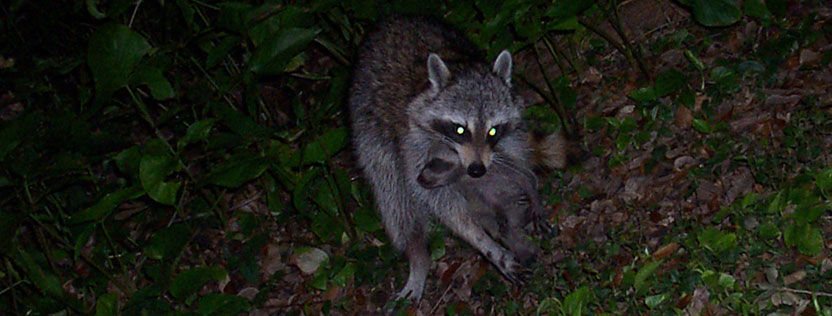NEED LOCAL HELP? We have
wildlife removal professionals servicing 95% of the USA. Click
here to hire a
local raccoon removal expert in your home town. Updated
2018. But read the below advice first!
Yes, raccoons can be dangerous to our pets. Raccoons can pose a
danger to all sorts of animals, from man’s best friend to man’s
equine friend, any animal that has contact with it being at risk
of exposure to diseases. Even if our pets have been inoculated,
by being in contact with raccoons, they’re creating stronger
viruses and different strains of the same virus.

Raccoons come in contact with our pets much more frequently than
they normally should. Common food sources bring them together,
even though they would have never met in natural circumstances.
These encounters allow for viruses to be transmitted back and
forth, increasing our pets’ exposure to contagious diseases,
allowing for viruses to become more infections and harder to
stop.
Raccoons have also been known to attack dogs and cats if they
feel the need to defend themselves, having the necessary
strength and skills to even kill small dogs and cats.
You should always be careful where you keep your pet food. Keep
it inside, especially during nighttime, but also during the day.
If you feed your pets or other animals outside, be sure to not
leave leftovers out. Once they’re done eating, take what’s left
back inside. Raccoons will also be attracted to bird feeders, so
if you have a bird feeder, try and secure it so that a raccoon
can’t reach it.
As cute as it may be, the raccoon poses a threat on many levels,
the safety and well-being of your pet(s) being just one of them.
You could also easily get sick by direct or indirect contact
with a raccoon. Raccoon roundworm is the most frequently raccoon
to human transmitted disease, and you can contract the virus
simply by cleaning up raccoon feces without proper protection
gear. In addition, if a raccoon sets shop on your property – in
your attic, for example – it will cause structure
deteriorations, and it will infect the area with its toxic
excrements.
If you hear or see a raccoon on your property, call animal
control as soon as possible. A wildlife pro will be able to
efficiently remove the raccoon and any young it might have,
decontaminate the area inhabited by the animal, and seal shut
all the raccoon entry points so that a different raccoon or
other critters can’t invade again in the future. If you don’t
want to hire a pro, educate yourself on how to successfully get
rid of raccoons in a humane manner. It’s not an easy job, and
it’s probably not even legal in your state for you to do this by
yourself, but the truth is nobody can really stop you if that’s
the choice you want to make. However you want to go about it,
just don’t think that the problem is going to resolve itself.
Raccoons are invasive and opportunistic – they’re nothing but
trouble to have around your house and around your pets.
Go back to the Raccoons in the attic
home page.
Read more articles about raccoons:
Should I Hire a Pro, or Remove Raccoons Myself?
Do Female Raccoons Make Good Mothers?